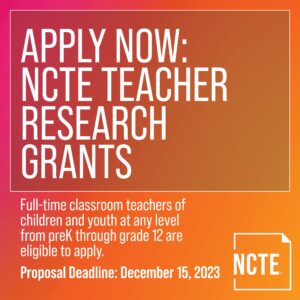This post was written by NCTE member Janell Miller.
In 2019, I applied for NCTE’s Research Foundation Teacher Research Grant during my sixth year of teaching in a classroom setting while pursuing my master’s degree at North Carolina State’s curriculum and instruction program. During my master’s journey, I decided to complete an action research thesis focused on cooperative learning in the English classroom. The purpose of the grant was to help me explore the pedagogical structures necessary to capitalize on the benefits of cooperative learning in the high school ELA classroom. My professor at the time, Dr. Carl Young, a long-time NCTE member, encouraged me to both join NCTE and apply for their Research Foundation Teacher Research Grant in order to secure additional resources to support the implementation of my action research plan.
The grant application process was relatively straightforward. Having a mentor familiar with NCTE and with experience in writing grant applications made my entry into the realm of educational research, particularly action research, much easier. As a master’s student, I had the opportunity to draft a proposal before the grant application officially opened, and when it became available, I was able to tailor my proposal to meet the specific requirements. The application required a statement of significance explaining why the work was important and a statement of motivation for pursuing the research. A description of the study, timeline, and budget were also requested.
After learning I had been a grant recipient, the grant money helped me acquire class sets of literature circle texts, including Born a Crime by Trevor Noah, A Long Way Gone by Ishmael Beah, and The Joy Luck Club by Amy Tan. I was also able to purchase a substantial quantity of sticky notes for students to annotate the texts as well as audio recorders to document their literature circle conversations. These resources were particularly helpful when we transitioned from in-person classes to online learning during the spring semester due to the COVID-19 pandemic.
The reporting process per conditions of the grant required one interim report. This report was a reflection of my experience conducting the research, including the actions taken, the subsequent outcomes, as well as next steps. I also found that reporting served as a means of holding myself accountable for executing my planned activities and making deliberate instructional decisions. As a result, it facilitated reflection on my teaching approach and how I could adapt based on what I observed.
Applying for and utilizing the NCTE Research Foundation Teacher Research Grant program significantly contributed to my growth as an educator and researcher. I found immense value in documenting my learning journey, the challenges I encountered, my adaptations, and the evolution of my thoughts regarding cooperative learning in the English classroom throughout the project. Additionally, the acquisition of these course texts was invaluable to my school’s English department because the text sets became a part of the department library, enabling all teachers to check out the books for use with their classes. Furthermore, my students benefited from valuable lessons and skills acquired throughout the grant cycle, largely due to my growth as an educator and researcher.
In retrospect, I wish I would have learned more about the opportunities provided by NCTE earlier in my career as an English teacher. I hope that other classroom teachers recognize that there are organizations and resources—like those through NCTE—available to support them and their students. While writing proposals may seem daunting, you don’t have to navigate this process alone. Utilize your teacher networks, collaborate with your peers, and together, you can make a meaningful difference in your students’ lives, classrooms, and schools.

Janell Miller is a third-year PhD student in the Department of Teacher Education and Learning Sciences at North Carolina State University with a concentration in literacy and English language arts education. She taught high school English in Greensboro, Winston-Salem, and Raleigh, North Carolina, before beginning the program. Her research interests include critical, culturally responsive pedagogies, critical consciousness, classroom discourse, and emotional literacy. Specifically, she is concerned with the transformative potential of diverse texts and dialogic pedagogies in ELA classrooms. Currently, Janell works with preservice middle grades social studies and language arts teachers.
It is the policy of NCTE in all publications, including the Literacy & NCTE blog, to provide a forum for the open discussion of ideas concerning the content and the teaching of English and the language arts. Publicity accorded to any particular point of view does not imply endorsement by the Executive Committee, the Board of Directors, the staff, or the membership at large, except in announcements of policy, where such endorsement is clearly specified.

2023 NCTE Research Foundation Teacher Research Grants—Deadline: December 15
These grants are supported by the NCTE Research Foundation, which is funded through 5% of all NCTE membership dues.

